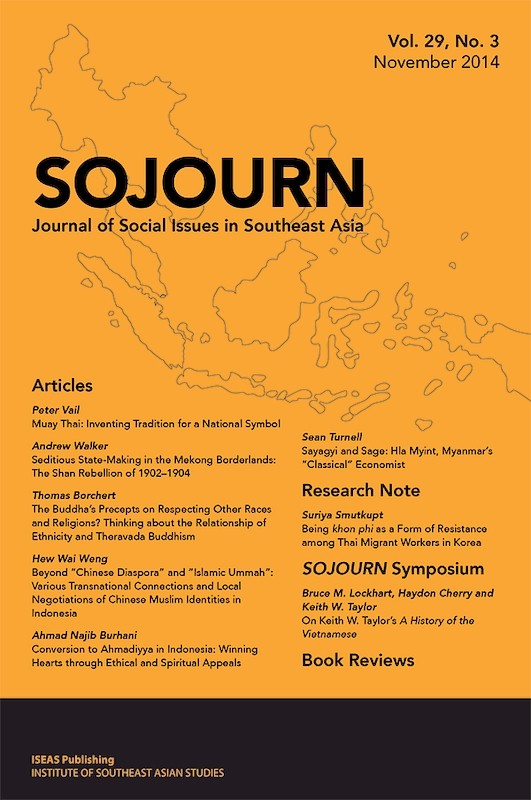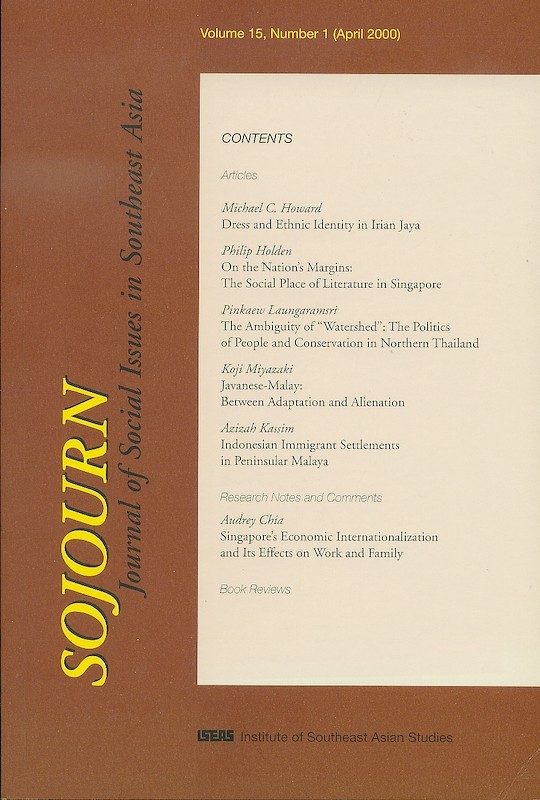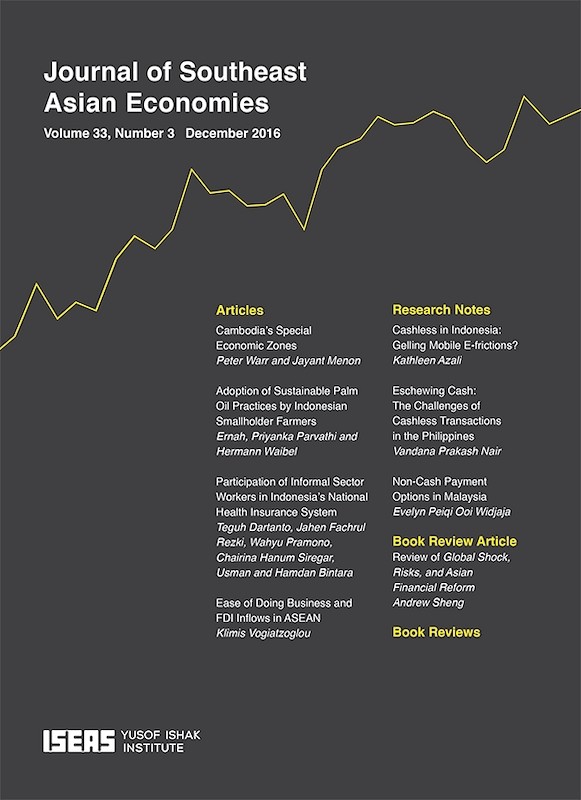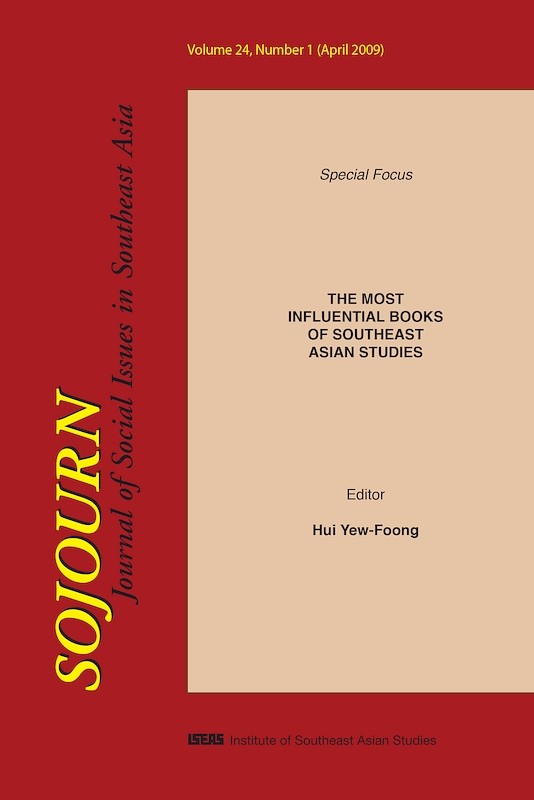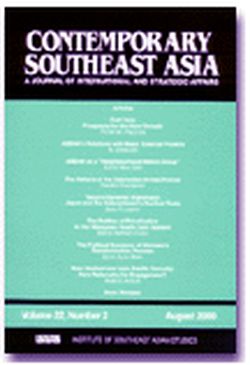SOJOURN: Journal of Social Issues in Southeast Asia Vol. 28/1 (March 2013)
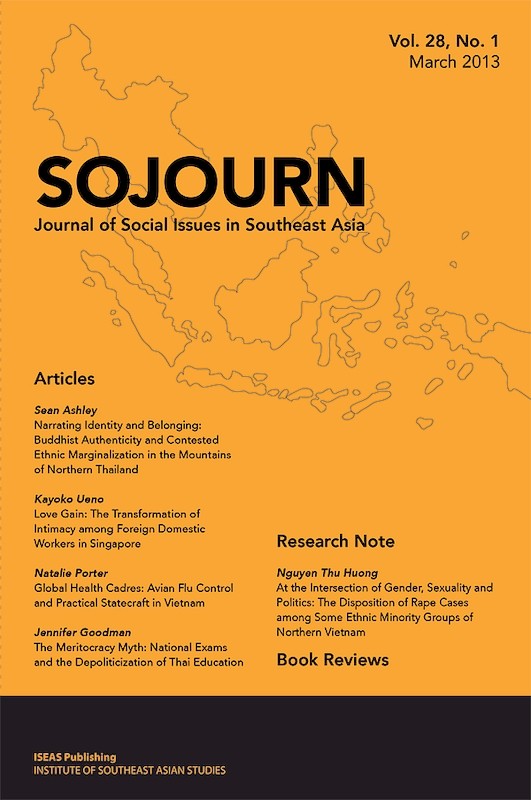
Date of publication:
March 2013
Publisher:
Institute of Southeast Asian Studies
Number of pages:
178
Code:
SJ28/1
Contents
-
SOJOURN: Journal of Social Issues in Southeast Asia Vol. 28/1 (March 2013)
[Whole Publication] -
Preliminary Pages
- ARTICLES
-
Narrating Identity and Belonging: Buddhist Authenticity and Contested Ethnic Marginalization in the Mountains of Northern Thailand, by Sean Ashley, author see abstractProcesses of exclusion and inclusion structure the relationship between Theravada Buddhism and socio-ethnic identity in Northern Thailand. The Dara’ang, a Mon-Khmer speaking population, practice a form of Buddhism similar to that found amongst various Tai cultures of the region, but distinct in many ways from that propagated by the institutions of the modern Thai state. Fieldwork conducted in Dara’ang communities is the basis for an exploration of the ways in which adherence to Theravada Buddhism supports both the presence of the Thai state within highland villages and the production of narratives that challenge the negative social representation of Dara’ang and other highland ethnic-minority peoples.
-
Love Gain: The Transformation of Intimacy among Foreign Domestic Workers in Singapore, by Kayoko Ueno, author see abstractPrevious scholarship on the transformation of intimacy among foreign domestic workers has focused mainly on the care/love drain on the children left behind in workers’ countries of origin. It has neglected the ways in which individual domestic workers struggle to gain love and care in destination countries. Among foreign domestic workers who have extended their stays partly because of their bonds with boyfriends, partners, or even “husbands” working in Singapore, the care drain widely observed among the families of foreign domestic workers in their home countries can be coupled not only with monetary gain but also in some instances with a gain in love and care for the foreign domestic workers themselves. A decade of participant observation and qualitative interviews, conducted mainly with domestic workers, also indicated that intimacies are also shaped by Singaporean policies on foreign domestic workers and by the strong economic demand from their families back home.
-
Global Health Cadres: Avian Flu Control and Practical Statecraft in Vietnam, by Natalie Porter, author see abstractRecent scholarship suggests that in areas featuring entrenched poverty and compromised state infrastructures, disease outbreaks prompt multinational interventions that often supplant state institutions in the provision of health services. Ethnographic observation of a multinational avian influenza project in Vietnam permits exploration of the ways in which “global health” operates in a Communist state characterized by an active governmental apparatus. Descriptions of the routine activities of one veterinary cadre illustrate the practical actions through which the Vietnamese state exerts influence over global health processes. In the daily work of bird flu management, global health cadres negotiate an inconstant divide between multinational health agendas and established practices of state-making. The analysis thus begins the crucial task of addressing the ways in which global health interventions operate in nations that, while vulnerable to public health emergencies, are nevertheless characterized by growing economies and influential state apparatuses.
-
The Meritocracy Myth: National Exams and the Depoliticization of Thai Education, by Jennifer Goodman, author see abstractThailand’s national exam, the Ordinary National Educational Test (“O-Net”), is explicitly intended to standardize education, but it has also become the producer and product of what the test writers consider ordinary knowledge in Thailand — the knowledge of the dominant class. While branches of the Ministry of Education claim to use exam results as a means of objectively measuring students’ and schools’ capacity, a closer inspection of O-Net exam questions reveals that the test perpetuates biases in the Thai education system. Through the ritual of taking the exam at the same time in the same formation, students across the country are indoctrinated into an “imagined community” and convinced of the exam’s equalizing power, with the result that the exam is spared a social critique. Thus, through an illusion of objectivity, the exam is successful in depoliticizing the preferential access to higher education enjoyed by Bangkok’s middle class and elite and in reinforcing the myth of meritocracy.
- RESEARCH NOTE
-
At the Intersection of Gender, Sexuality and Politics: The Disposition of Rape Cases among Some Ethnic Minority Groups of Northern Vietnam, by Nguyen Thu Huong, author see abstractHow is rape perceived and handled by members of the Dao and Hmông minority groups in Lào Cai, a northern province of Vietnam? How are cultural notions relating to sexuality, female virginity and marriage interpreted, played out and contested among victims’ family members, their wider kin networks, and the authorities responsible for upholding the law at the grass-roots level? In particular, how is the social notion of honour used as a patriarchal tool in influencing decisions about whether or not to press charges against rapists or not? The results of fieldwork in Lào Cai during 2007 are reported.
- BOOK REVIEWS
-
BOOK REVIEW: Contestations of Memory in Southeast Asia, edited by Roxana Waterson and Kwok Kian-Woon, by Michael Hawkins, author
-
BOOK REVIEW: Malaysian Maverick: Mahathir Mohamad in Turbulent Times, by Barry Wain, by Meredith L Weiss, author
-
BOOK REVIEW: Religion-State Encounters in Hindu Domains: From the Straits Settlements to Singapore, by Vineeta Sinha, by Yeoh Seng Guan, author
-
BOOK REVIEW: Natural Potency and Political Power: Forests and State Authority in Contemporary Laos, by Sarinda Singh
-
BOOK REVIEW: Glimpses of Freedom: Independent Cinemas in Southeast Asia, edited by May Adadol Ingawanij and Benjamin McKay, by Kenneth Paul Tan, author

